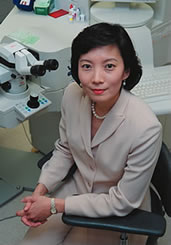For Yunhee Lee, the Eyes Have It
![]()
sidestep into studying biological mechanisms as
an electrical engineer sparked an interest in Yunhee Lee, M.D., M.P.H.,
that would become a passion and, ultimately, a career in medicine. “I
was combining engineering principles with biological processes, and something
just clicked,” she remembers. After earning a Bachelor of Science
at Massachusetts Institute of Technology and a medical degree at Harvard,
Lee went on to study and practice refractive surgery, a field tailor-made
for her interests in biomechanics and optical physics.
 Last
March Lee was named medical director and division chief of Bascom Palmer
Eye Institute of the Palm Beaches, the satellite facility of the School
of Medicine-based practice. Her experience as director of a laser vision
center at the New England Eye Center in Boston gave Lee insight into the
factors that make a clinical enterprise successful.
Last
March Lee was named medical director and division chief of Bascom Palmer
Eye Institute of the Palm Beaches, the satellite facility of the School
of Medicine-based practice. Her experience as director of a laser vision
center at the New England Eye Center in Boston gave Lee insight into the
factors that make a clinical enterprise successful.
“I see my role as being not only to facilitate smooth operations, but also to grow the practice,” she says. “There is a wealth of potential.”
One area of growth especially important to Lee is innovation in refractive laser surgery. Customized corneal ablation is a new service offered at Bascom Palmer Eye Institute and works like the popular LASIK surgery in using a laser to reshape the surface of the cornea and achieve sharper vision. By precisely measuring the optical aberrations in an individual’s eye, customized ablation technology allows ophthalmologists to tailor laser treatment to each patient, providing a result that is closer to perfect vision and potentially better than that attained with spectacles or contact lenses.
Relatively new as ophthalmic procedures go, refractive surgery has evolved along with Lee’s own experience. “The future of laser treatment is here,” Lee says. “We’ve been targeting a goal, and we are now achieving that goal.”
Apart from laser vision correction, Lee’s practice includes other corneal services, such as cataract surgery and corneal transplantation. The magnitude of providing treatment that can change the way a patient sees the world is not lost on her. Her first cataract procedure as a resident, Lee recalls, allowed an elderly patient to see clearly for the first time after years of essential blindness.
“The results of ophthalmic surgeries are often
very dramatic and life-altering,” she says. “To have a chance
to free patients from what’s holding them back is very gratifying.”